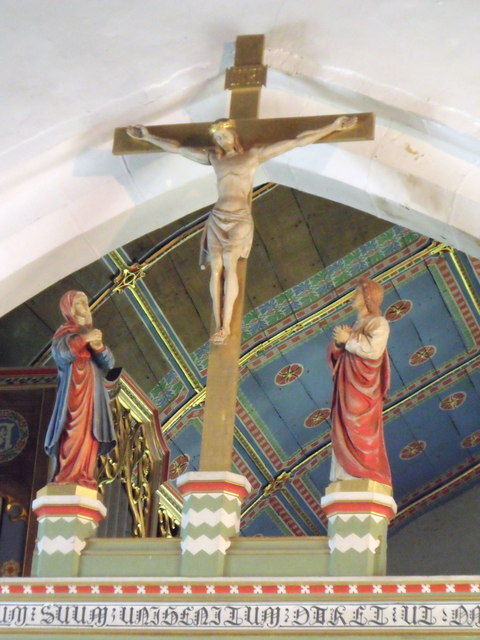
The holy rood at St. Andrew’s, Nuthurst, West Sussex
cc-by-sa/2.0 – © nick macneill
Today’s hymn from Sing Praise is Keith & Kristyn Getty’s “Beneath the cross of Jesus”. As we approach Holy Week we focus more on the inevitable death of Jesus, and there are many hymns on this theme, which is why we’re starting well ahead of time.
I liked this one, because it gets a good balance between the individual or devotional approach to the Cross and a corporate one. Not only the words but also the music is quite different from “O to see the dawn” that I sang on 9 March, which was another Keith Getty composition but in partnership with Stuart Townend. Perhaps it’s that difference in partnership that brings a much softer approach both to the music (the tune is a pleasant, almost folk-style one, although set a bit low for my tenor voice) and also the words, where the message of Jesus suffering punishment for us is replaced with a meditation on how Jesus has brought grace to me, the church and the world.
The first verse is personal – “Beneath the cross of Jesus I find a place to stand, and wonder at the mercy that calls me as I am. For hands that should discard me hold wounds which tell me ‘Come’. Beneath the cross of Jesus my unworthy soul is won.” The second tells how by his death Jesus brought into being a new family of those saved by grace: “Beneath the cross of Jesus see the children called by God”. This is symbolised by the words (in the Bible, not in this hymn) that Jesus spoke from the cross telling his mother Mary and closest disciple John to treat each other as mother and son after his own death.
The third verse follows with what that family should do in response: “We follow in his footsteps where promised hope is found”. The last lines refer to the Church as the Bride (an image found in the book of Revelation) and finish with “Beneath the cross of Jesus we will gladly live our lives”.